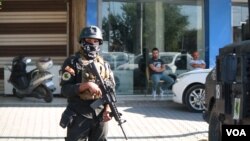Iraqi forces threatened on Wednesday to resume operations to capture northern Kurdish-held territory after accusing authorities there of delaying handing over control of Iraq's borders with Turkey, Iran and Syria.
Prime Minister Haider al-Abadi on Friday declared a pause in an offensive that began on Oct. 16 to take over areas claimed both by his government and the autonomous Kurdistan Regional Government (KRG).
Abadi ordered economic and military retaliation against the KRG after Iraqi Kurds voted for independence in September in a referendum that Baghdad declared illegal.
He said the truce was meant to allow Iraqi troops to deploy without hindrance in the disputed areas and at the international borders.
Kurdish officials said on Tuesday they were willing to allow Iraqi "oversight" at the border but said the KRG had to remain in control of crossings into the Kurdish region.
The Iraqi Joint Operations Command accused the KRG of using the talks to "buy time" in order to strengthen Kurdish lines.
"During the negotiations, the (Kurdish) region was moving its forces and building new defenses," the Iraqi statement said.
"We will not allow it; the federal forces are mandated to secure (the disputed) areas and borders."
The Kurdish Peshmerga fighters' command accused Iraqi forces of massing weapons and threatening force to resolve "domestic political differences."
Iraq's entire land border with Turkey is located inside the Kurdish autonomous region, and has been controlled by the Kurds since before the fall of Saddam Hussein in 2003.
Iraqis troops on Tuesday set up positions between the Turkish and the Iraqi Kurdish checkpoints at the Habur border crossing between the Turkish town of Silopi and the Iraqi town of Zakho. That meant vehicles crossing the border were subject to three checks.
Control of the border area is of crucial importance for the landlocked Kurdish region. An oil pipeline runs from northern Iraq into Turkey, carrying crude exports which are the Kurds' in principal source of funds.





